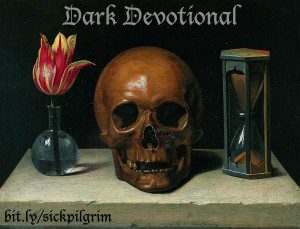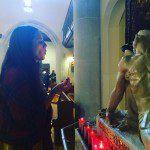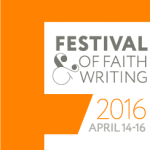My husband and I lived in Edinburgh, Scotland for three years in graduate school. We felt at home amongst dead theologians, drizzly sideways rain, and a dram of whisky that would warm you up when it got dark at 3:30. We ate cheaply, walked miles a day, and spent too-many hours in small, chilly offices and libraries, pouring over old words. Weekends we’d invite friends over to drink cocktails and, after hours of political and religious debate, they’d leave their cheap beer and stumble home in the wee hours stopping for chips with salt and sauce. We felt cosmopolitan, grown up, free. Yet the alcohol, the food, and the conversation were just ways to get out of my head. I indulged my body to escape my mind. I drank a glass too much to pretend at practicing presence.
We have an odd relationship to food, don’t we? We use it to mask our hunger and fill up all the empty spaces. We pick and choose our organic produce and our craft coffees as if our food choices make us holy. We stuff the boxed mac ‘n cheese into the closet and pair our wine with cheese in public. Underneath all the posturing, we’re left with rumbling bellies and a deep hunger to be filled.
But Jesus provides bread in abundance. Matthew records his feeding of the multitude: “He said to Philip, ‘Where can we buy enough food for them to eat?’ He said this to test him, because he himself knew what he was going to do. Philip answered him, ‘Two hundred days’ wages worth of food would not be enough for each of them to have a little.’ One of his disciples, Andrew, the brother of Simon Peter, said to him, ‘There is a boy here who has five barley loaves and two fish; but what good are these for so many?'”
Yes, what good are these for so many? We hold a few paltry loaves and fishes and throw up our hands in despair. Our soul’s hunger pains wake us in the darkness and find bodily presence in our anxiety and depression. Our need feels too great and we are always hungry. So instead of turning to the source of bread, instead of feasting on Christ, we content ourselves by feeding our bodies what our souls long for. Me? I go for sugar and caffeine. Coffee and jellybeans make my head buzz and lift my mood but they only mask my deep, deep hunger for quiet, peace, and joy. In contrast to my quick fix, Jesus provides bread – the most basic and ordinary of food.
In Home, her novel about the homecoming of a wayward son, Marilynne Robinson writes, “All bread is the bread of heaven […] It expresses the will of God to sustain us in this flesh, in this life. Weary or bitter or bewildered as we may be, God is faithful. He lets us wander so we will know what it means to come home.” The provision of bread promises sustenance. It promises presence. Most of all, it promises homecoming, where we will “dwell in the house of the Lord.”
I’ve been listening on repeat to the brooding loveliness of Sufjan Stevens’s latest album about his mother and her abandonment and death, Carrie & Lowell. The last track, “My Blue Bucket of Gold,” gets its title from rumored treasure troves in the Oregon wilderness. Stevens reaches out in this last song for a love that will satisfy and take him in, asking for someone to: “Raise your right hand/ tell you want me in your life.” But the song ends on a musical interlude — we’re left hanging, wondering and hoping desperately for all our broken pieces to find a home.
We are supposed to find a home, a shelter, right in the very body of Christ. We are told to feed on Him. Frankly the language of “feeding on Christ” feels a bit Lolita-ish, with turned-out organs, where love has veered disastrously off course. If we actually fed on Christ, instead of the coffee and jellybeans, we may find ourselves gorging ourselves on a God we’re ravenous for and yet also a bit afraid of.
Bread will make us fat, the diet gurus tell us, so we starve our bodies or throw our hands up in the air and eat another donut. We’re scared of bread because we’re scared of God. We dive into our dark holes and pitch our tent there, we live in those spaces of hunger still waiting to be filled.
Bread is never just bread. It is manna in the desert, it is scripture, it is the body of Christ. In the feeding of the multitude, bread multiplies like those metaphors do. But this multiplication happens in secret, like the mystery of yeast penetrating dough.
“When they had had their fill, he said to his disciples, ‘Gather the fragments left over, so that nothing will be wasted.'”
This is more than putting bread into Ziploc bags. It is a gathering of fragments–the scattered and broken leftovers that will not be wasted. Because in God’s economy, nothing will be wasted, not even what is broken. All that is shattered will be gathered up, multiplied in meaning, resonance, and truth, until we are home.

 Ashley Hales is a Protestant who went to a Catholic prep school, so she’s basically got all her bases covered. She holds a Ph.D. in English from the University of Edinburgh, Scotland, but spends most of her time chasing four small children and helping her husband start a church. Her writing has been featured at various and sundry places such as Books & Culture and Think Christian. She writes regularly at aahales.com and The Mudroom, and loves to make friends on Twitter.
Ashley Hales is a Protestant who went to a Catholic prep school, so she’s basically got all her bases covered. She holds a Ph.D. in English from the University of Edinburgh, Scotland, but spends most of her time chasing four small children and helping her husband start a church. Her writing has been featured at various and sundry places such as Books & Culture and Think Christian. She writes regularly at aahales.com and The Mudroom, and loves to make friends on Twitter.












